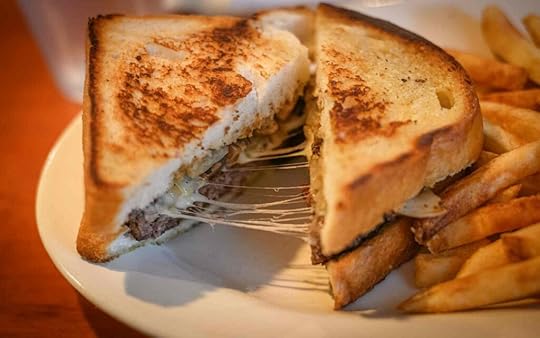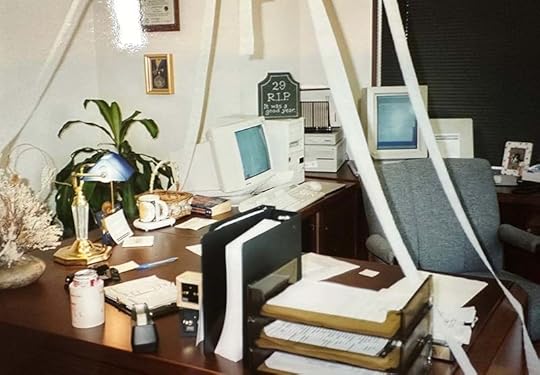Diane M. Simard's Blog, page 2
August 1, 2024
Buzzwords Guaranteed to Annoy
I have been pondering a blog on this topic for a couple years. But I didn’t want to provoke a wave of unsubscribes so I held off, biding my time.
And then, on July 9 The Wall Street Journal published a front-page article titled “Let’s ‘Double-Click’ on the Latest Cringeworthy Corporate Buzzword.”
Like an “Open sesame” from the heavens, my window of opportunity finally opened. Please indulge me while I lay down some back story.
Where some view the world through colors or music, I see the world in words. I especially love words that don’t get used often. In fact, I just finished a book written by a journalist who used such powerful words I wrote them down as I read. Here are a few:
spasmodically
lurch
ooze
clench
doddle
These terms evoke not just movement, but the speed and strength of movement. Even more impressive was how the author used each word only once in the entire book.
That’s right. Only once. Which is key to the point of this post.

Buzzwords are annoyingly (my opinion) repetitive phrases or jargon words that get injected into conversations intended to impress, gain relevancy or attention, or illustrate an emotion.
Buzzwords are created when listeners hear them and think, “That’s cool—I should say them too so others think I’m celebrated | substantive | hip | gullible.” But then they pyramid scheme them in conversations to the point they no longer have any meaning.
Here comes today’s buzzword roast.
Unpack. As in, “Let’s unpack that thought.” Which is a gentler term for, “What you just said makes no sense, but since this is a critical conversation, I’m going to ask you clarification questions to attempt to understand your point.”
Ecosystem. A scientific term that, unfortunately, made its way into business communication. During a team meeting several years back, I cringed as someone used it six times during a five-minute tirade to describe a concept that made zero sense.
Double-click. For example, “Let’s double-click on that and go deeper.” I like this one. Seriously, I hadn’t heard it used in conversations until I read The Wall Street Journal article, but then I’ve been doing project-based work from home the past two years so I don’t get out much. According to the article, some in sales claim they’ve been using it since the 1990s, a decade after Apple Computer’s Lisa computer introduced double-clicking as a way to open an object.
Viral. A term to describe when online content like a video, image, or story spreads quickly and widely across the internet. What is the definition of widely? One or two people shared your whatever? Hundreds? Thousands? Ka-zillions?

Circle back. The act of following up, with a nod to cattle roundups in the Wild West.
Cutting edge. A term so outdated, overused, and meaningless I begin to hyperventilate. Updating cutting edge to bleeding edge didn’t solve the problem.
State of the art. Enough already. Now I’m suffocating.
Here’s to being old—I mean wise—enough to appreciate the swarm of words that buzz around in my head.

July 7, 2024
High Standards, Low Expectations
“Life is harder when you expect a lot of the world and little of yourself.
Life is easier when you expect a lot of yourself and little of the world.
High standards, low expectations.”
~ James Clear, Author of Atomic Habits and keynote speaker
Whoa. That’s deep, but I like it.
James Clear’s words remind me of business leaders I used to work with who thought they were under promising and over delivering, when in fact they were masters at the mirror opposite.
I got a sinking pit in my stomach every time I watched them cast a vision by introducing a new corporate project or direction. “Here we go again,” I would think to myself. Their visions were words filling up space and time because there were no supporting plans, timelines, funded budgets, commitments, or buy-in from anyone other than the one casting the vision.
Metrics to measure progress and drive accountability? Non-existent.
Too many times to count, I (and many others) completed plans and talking points, drafted preliminary budgets, designed logos, and scheduled meetings to discuss potential ways to achieve the vision casters’ bold intentions.

Ultimately, our carefully crafted planning got glossed over. Ignored. Eventually forgotten. Because the most effective way to take everyone’s mind off a transitory idea that has no structure is to cast a new, nobler vision. Some attribute the behavior to a lack of focus—the vision caster is perpetually looking for the next shiny object. I believe the behavior is a survival tactic, a deliberate diversion driven by a need to recapture a perceived loss of control.
The process of hopping from one disorganized idea to the next was grueling to accommodate, but I became shamefully accustomed to the routine.

That was then. Nowadays, planning activities previously performed by humans can be knocked out in seconds by AI (artificial intelligence), so all the time and company resources we expended in the past will likely someday not be as costly.
I say someday because today’s machine-generated planning ideas are not always relevant or even coherent, but we’ve been assured AI will keep improving. We simply need to figure out how to accommodate the demanding infrastructure needed to make AI more mainstream, including gobs more energy to power data centers, more powerful AI chips to train machine learning algorithms, and potentially a new generation of computing capability, including quantum. Efforts are well underway on the last two challenges, but the projections of future energy demands due to AI are staggering. In January, the International Energy Agency forecast that global data center electricity demand could more than double from 2022 to 2026, due in large part to AI.
Progress always has a price tag.
In reflection, my efforts to accommodate the vision casters during my years in corporate America could have been classified as mere busy work to pass the time and justify some of the jobs I had. Those experiences were uncannily similar to kindergarten when my teacher, Mrs. Fernley, “assigned” me pages in a coloring book to color because we’d already had nap time and still had an hour to kill before recess.
I’m driven now by what matters (high standards), not on what passes the time (low expectations).
To priorities!


June 3, 2024
The Trip of a Lifetime
Twenty years ago this month, I had the extraordinary opportunity to attend the Joint Civilian Orientation Conference (JCOC), the U.S. Secretary of Defense’s own offering to a select group of civilians to travel to various places around the globe with all branches of the military.

Over the course of a week, our group of fifty from all over the country was hosted by US European Command and traveled by C-17 military transport aircraft from Washington, DC to military bases across Europe.
Highlights included spending a day at Ramstein Air Base in Germany, then flying to Bosnia where we participated in foot patrols with members from the Indiana Army National Guard as part of NATO’s commitment to peace after the Bosnian War.
From there it was on to Baku, Azerbaijan, to spend a day with US Navy SEALs who were participating in joint training exercises. The SEALs took us on boat rides in their rigid inflatable boats (RIBs) where we spun doughnuts on the Caspian Sea, then let us shoot an M4 carbine. When it was my turn, the SEAL assisting me kept saying, “Ma’am, the target is over here.”
We left Azerbaijan for Rota, Spain, where we were flown by carrier on-board delivery (COD) aircraft out to the USS Enterprise (CVN-65) Navy aircraft carrier. Although the Enterprise has since been decommissioned, it came online in 1958 and was the world’s first nuclear aircraft carrier. It was also where the aircraft carrier scenes from the first Top Gun movie were filmed.


Somehow, I survived the tailhook landing onto the Enterprise, although afterward I wished we had not enjoyed so much sangria the night before. While on the Enterprise, we ate lunch with the sailors, then were taken up to the flight deck where we watched an airshow and saw an F/A18 Hornet break the sound barrier as it flew overhead.
And then it came time to leave the Enterprise on the COD aircraft via catapult launch. While the flight deck crew was setting the catapult, we were told to brace the bottoms of our feet against the seat in front of us to avoid doing a face plant. I was convinced I was going to pass out from anxiety, but we were already in the air flying before I realized what had happened.
In retrospect, the week was a blur due to all that was going on with me at the time. A week before, my ex-husband had sold the company he had built and I, and many others, had helped him save, so I was out of a job. We had moved into our new house a few months before, so things were still getting settled. On top of that, I realized he and I were moving in opposite directions, so my personal life was in turmoil.

But the JCOC trip, with all its sensory overload and once-in-a-lifetime experiences, injected me with a restored sense of confidence and self-awareness. Above all, I developed an even greater sense of appreciation for the commitments and sacrifices our troops from all branches of military service make every day.
To those who serve and protect,


May 1, 2024
Me vs. ChatGPT on the Topic of Being Alone
Last week, I came across this quote typically attributed to George Washington:
“It’s better to be alone than in bad company.”
Ouch. Well, actually no, it’s not painful. It’s true – at least in my opinion and experience. Some of my best healing time from painful relationship breakups was a result of me experiencing quality alone time, reflecting.

My methods for healing after getting dumped by boyfriends in college included reading and rereading the bestselling book first published in in 1985: Women Who Love Too Much: When You Keep Wishing and Hoping He’ll Change. An Amazon search for the book now spits out a list of books with some astoundingly long titles. Including this one: Women Who Love Too Much: Thinking About the Person You Love Makes the VTA Flood Your Body with Dopamine, Which Makes You Feel Euphoric.
Yeah, yeah, I know. Long titles increase the probability of successful search engine hits. We have so many books, so many opinions, so many bots now giving advice.
I wondered what artificial intelligence (AI) had to say about the premise that it’s better to be alone than in bad company. So, I asked ChatGPT to write a 400-word blog about it.
Here is ChatGPT’s title and first two paragraphs:
The Value of Solitude: Choosing Quality over Quantity in Company
In a world that often celebrates the extroverted, the sociable, and the constantly surrounded, the notion of solitude can seem foreign or even intimidating. However, as the wise adage goes, “It is better to be alone than in bad company.” This timeless wisdom holds profound truth that transcends generations and cultures.
In today’s hyper-connected society, the pressure to constantly engage with others can be overwhelming. Social media platforms bombard us with curated glimpses into the lives of others, fostering a culture of comparison and FOMO (fear of missing out). But amidst this noise, the importance of quality over quantity in companionship becomes increasingly evident.
Am I the only one hearing snoring sounds? These paragraphs remind me of the droning background white noise necessary for me to fall asleep.
AI is not going away. Most of those I know who use it, including me, use it to generate ideas. One of my consulting clients recently asked AI to write a press release, which he then emailed to me and asked me to rewrite. Great! Job security for at least a little while longer.
Remember in the intro paragraph where I said the “It’s better to be alone than in bad company” quote is typically attributed to George Washington? Well, I say typically, because after some googling, I found that, according to The Leaders Institute, the quote is actually one of the 110 Rules of Civility and Decent Behavior in Company and Conversation.
George Washington reportedly copied the quote by hand at the age of fourteen, along with the other 109 Rules. All 110 Rules were supposedly based on a set of rules composed by French Jesuits in the year 1595. Today’s scholars believe all the rules were likely copied by Washington as a penmanship exercise, but someone at some point in history decided it should be attributed to him because he wrote it down.
And now you know the rest of the story. Thank you, Paul Harvey, for that timeless quip.
By the way, I asked ChatGPT if I could include his signature line, and here’s the reply I received:

Using “And now you know the rest of the story” in your blog should generally be fine, as it’s a well-known phrase associated with the late radio broadcaster Paul Harvey. However, if you’re planning to use it as a regular feature or in a way that closely resembles Harvey’s style or content, you may want to consider potential copyright issues. It’s always a good idea to give credit where it’s due and to avoid directly copying someone else’s distinctive style or content without permission. If you’re unsure, you could also consult a legal expert for advice on how to proceed.
Sometimes all you can do is smile . . .

April 2, 2024
Beneficial Blunders
In the grand scheme of life, I have not arrived at who I am today because of my successes.
I am who I am because of my failures. Sounds harsh, maybe, but I take stumbles seriously, thanks to their inherent value.
Here are two of my classic malfunctions:
Tough love event:
Not getting selected for the Chorale singing group my first year of college.
Background:
During childhood in a town of eighty people, I was not accustomed to losing. Winning typically came easily because there wasn’t much competition.
What I learned:
How to fail with grace. I pouted and cried in seclusion, then took voice lessons. As it turns out, I am a soprano, not an alto, so I had been singing the wrong parts. I tried out for the same group the following year and was selected. Here I am with Mickey at Disneyland during our southwest U.S. Chorale tour in May 1986.
Tough love event:
Almost getting charged with a minor in possession offense when I was in 8th grade.

Background:
My classmate and I made the doofus decision to drink a beer while sitting on the trunk of a car parked on main street in Elba, Nebraska. I don’t recall who gave us each a bottle of Miller beer, but we had just sat down with our beers when a county sheriff’s deputy, who knew my family well, pulled up and asked what we were doing. He got out of the police car, looked around, looked me straight in the eye, and said something to this effect: “How dumb are you?” Then he poured out our beers and left.
What I learned:
I am a horrible law breaker. And extremely fortunate.
“We don’t grow when things are easy. We grow when we face challenges.” Thank you, Zig Ziglar, for the insight! I have had lots of opportunities to grow.
Before signing off, are you feeling spring vibes? I definitely am, but I miss the crabapple tree in our front yard that was lost during last year’s tornado. For one week each April, it bloomed with a vibrant shade of fuchsia pink flowers. I will always treasure this photo from several years ago, when the tree was ablaze with dawning glory.
To all my favorite mistakes,


March 4, 2024
That Embarrassing Thing I Did in College
The best formal education I received was while pursuing a journalism degree. Print journalism, not broadcast journalism. Radio deejays and TV personalities got all the attention, but their careers seemed to fizzle once the public declared they were no longer young and cool.

What I specifically wanted was a public relations (PR) degree, but the best I could find within the state of Nebraska was a journalism degree with a PR emphasis at what was then Kearney State College (KSC), which is now part of the University of Nebraska system. So, I throttled ahead. As a print journalism major, I learned to write hard news in accordance with Associated Press (AP) style, citing sources and confirming facts. References to numbers one through nine are generally written as words, and anything above nine is generally written as numerals. When referring to money, use numerals. After that, AP style rules get mind-blowingly complex.
All the structure, with all its rules, was good for me. News reporting classes taught me to listen and observe body language. Somehow my brain transformed into a receptacle that retains stuff most people never even see or hear.
Since I was in training to be a newspaper reporter, something I already knew I didn’t want to be, I had to serve time on KSC’s student-run newspaper, The Antelope. We were, after all, the KSC Antelopes, also known as the Lopers.
During my last two semesters at KSC, I was the copy editor for The Antelope. All our stories had to be completed a week before the paper was printed so it could be laid out—manually—which took days. Which meant that as copy editor I had to edit and compose headlines for something like twenty stories over the course of a Thursday afternoon and evening for the following week’s paper. The worst part was I had to give up my Thursday nights, which was absolutely heartbreaking since Thursday night was THE party night at KSC. No more penny pitchers, no $5 all you can drink specials. Such sacrifice.
I also had to write news stories for the paper, and one in particular is a laugher. Not only did I write this story, I wrote this embarrassing headline:

In all fairness to me, “escort service” was the term used by KSC’s Residence Hall Association. I repeat, I did not coin that description specifically for the article. My, how things have changed over the course of a few decades. Words do matter!
Once I got my degree in hand, I bypassed the newsroom and headed straight for corporate America, where I ended up in whatever departments needed writers: marketing, public relations, corporate communications, administration, executive, or my personal favorite, editorial services.
One time, I was tasked with hiring an assistant, and we received over 400 resumes. My favorite line from one of the resumes was this: “I would like this job because I really really really like to write.”
Yes, all these events did happen . . .
To a lifetime of really really really memorable stories!

February 2, 2024
Unlikely Gifts in Unmarked Packages
 ~ Amanda Fein Real Estate Professional – Compass
~ Amanda Fein Real Estate Professional – Compass One of the most memorable hostess gifts I ever received was in a container filled with straw.
“Put these in your refrigerator overnight, then release them in your garden tomorrow,” said my guest as she handed me a small paper bag.
I was perplexed until I opened the bag and realized it was a container of ladybugs, a thoughtful gift from Julie Aigner-Clark, founder and creator of Baby Einstein . I met Julie soon after COPE was launched at University of Denver’s Graduate School of Professional Psychology, and we bonded for many reasons, including the fact she is a fellow breast cancer survivor. She and her husband attended a mid-summer open house for COPE that Rene and I hosted a few years back.
. I met Julie soon after COPE was launched at University of Denver’s Graduate School of Professional Psychology, and we bonded for many reasons, including the fact she is a fellow breast cancer survivor. She and her husband attended a mid-summer open house for COPE that Rene and I hosted a few years back.
The morning after our event, I took her gift out of our kitchen refrigerator and carried it down to the flower garden outside my office window that I planted in memory of my late mother.
Some of the ladybugs took flight as I emptied out the contents, while others started crawling over blooming flower plants.
Over the course of that summer, I smiled and thought of Julie every time a ladybug crawled across a page of my book when I was reading outside. That winter, when we brought houseplants in the from deck and downstairs patio, several ladybugs came inside as well.


It appears that ladybugs have taken up permanent residence in our home, thanks to Julie’s enduring gift, and we benefit year-round from their presence. They are one of our “good bugs.” What I love most is their symbolism of sustainability. Over the course of their lifetime, which is typically one year, a ladybug can eat up to 5,000 insects, including aphids and other plant-eating pests.
Ladybugs represent the best of life itself. They make their colorful presence known, but they also do their part to help others and maintain nature’s balance.
Truly, the perfect gift.

January 3, 2024
The Power of Words
I think in words. For example, until recently I thought a patty melt contained corned beef, so I never wanted to try one. Why did I think this?
Patty melt makes me think of St. Patrick’s Day
St. Patty’s Day = corned beef and cabbage (gross)
Therefore, a patty melt must be made with corned beef
My naïve innocence is precious, isn’t it?

Let’s travel back in time to late summer 1995. On August 31,the day before my 30th birthday, my assistant sent this email to theentire administrative staff at the financial services company I worked at indowntown Dallas, intending to invite them to my surprise birthday celebration:

“We are mourning the loss of Diane’s first 30 years of life. Please join us in her office tomorrow at 2 p.m. to celebrate with cake.”
Within minutes, I received three phone calls and ten emails asking if I was still alive.
Words matter. In this case, they were well-intentioned words, but they created a public relations tornado. Thankfully, in 1995 we were limited to intracompany email, so the damage was quickly contained. Back then, no one above my pay grade was interested in figuring out the new way of communicating that was taking the world by storm, so I typically received only about three emails a day from other staff members.
Well, except for that day, anyway.
***
A week before Christmas I had lunch with a good friend who told me her word for 2024 is “grateful.” Merriam-Webster’s 2023 word of the year was “authentic,” and last year’s word was “gaslighting.” What’s your word for the new year? Mine is “clarity.”
Wishing you good health, much happiness, and wise word choices . . .

December 4, 2023
The Year Nothing and Everything Made Sense
Oh December, you overstuffed month of holiday hype, give me space to breathe.
On top of wrapping and decorating and traipsing out to holiday parties in the dark, allow me time to reflect on 2023—the year Taylor Swift apexed. The year of chaos. Unthinkable chaos.
Thankfully, there were welcome moments of unexpected clarity, too. For example, I set three personal goals in January. Here are the outcomes.
 Walk 1,000 miles to lose weight. It’s almost December and I have already logged nearly 1,900 miles. Weight-wise, I am a few pounds down, but unfortunately, I have developed quads of steel, not bird legs. Still, I’ll take it and vow to get more accurate at goal-setting next year.
Walk 1,000 miles to lose weight. It’s almost December and I have already logged nearly 1,900 miles. Weight-wise, I am a few pounds down, but unfortunately, I have developed quads of steel, not bird legs. Still, I’ll take it and vow to get more accurate at goal-setting next year.Publish my next book. I did the podcast and posted the funny memes and am forever grateful to those who supported me in my second effort. The most-consistent feedback readers shared? “Thank you for writing a short book with short chapters.”
Generate consulting revenue. Writing and blogging and speaking typically don’t generate huge amounts of income. That’s because so many others are writing and blogging and speaking, too. What those activities do for me is open doors, inviting me to meet and work as a strategy advisor with accomplished entrepreneurs seeking to amp up their businesses or plan their leadership legacies.
What I Learned
Here are my top takeaways from 2023:
Although I don’t have all the answers, I help others discover their answers within themselves.Even when I’m nurturing, harvesting, or resting, I need to simultaneously plant potential seeds of opportunity.When a cause no longer feeds my soul, the best thing I can do is share my opinions honestly and gracefully, then walk away.My favorite quote from a client: “Diane makes me feel heard.”
One last thought. Remember the jokes we made about the ThighMaster frenzy Suzanne Somers started in the early 1990s? Well, sadly, she died from breast cancer in October. But on a podcast last year she revealed she made almost $300 million from the ThighMaster toning system she invested in and helped promote. She also wrote numerous books on good health, starred in a goofy 1970’s sitcom, and offered a whole range of organic, toxin-free body products, but it was the ThighMaster that made her a fortune. “It still sells to this day even though we don’t advertise,” she said on the podcast.
By the way, I still use a ThighMaster for resistance training, which likely contributes to my quad situation.
And round and round we go.
Holiday blessings to all,

October 31, 2023
Heal Honestly and Loudly
Here’s a new one. Last month I was asked by the editor of Highlands Ranch Lifestyle magazine to write a 500-word article that intersects gratitude, my breast cancer experience, and my life as an independent author.
I submitted a 499-word article, but then two days later received a call from the editor. “I loved your article,” she said. “But it made me cry. I know your breast cancer experience was horrific and you captured it beautifully; however, this is a lifestyle magazine and we need something more positive.”
She was apologetic, and I understood her dilemma. It was the November issue after all, focused on thankfulness and turkey gravy recipes.
My pride wasn’t hurt. In fact, I was elated that I had educated someone new about how cancer is never invited and cancer never leaves. And then she said the dreaded words: “I love how you ended your story on a positive note. Why don’t you start the article with that?”
Drats. This was going to be a significant challenge. Tell an unpleasant story in such a way that it doesn’t make anyone cringe. Positive all the way. Slaying dragons and saving unicorns. Got it.

Well, I did rewrite the article but insisted the editor use someone else’s name for the byline (a sophisticated word that means the author of an article). I applied every ounce of magical powers I could muster, and I got the rewrite done.

When I compared the two versions, I wondered how many cancer survivors and caregivers would be offended that my story was presented in a gift-wrapped box tied with pink ribbon.
My biggest lesson learned? When I write for someone else who has editorial authority because it’s their publication, that’s the point. It’s their publication, and I remain grateful for the opportunity to share my story and bring attention to the intersection of cancer and mental health.
Healing is rooted in honesty, not façade. And it wasn’t until I started writing honestly about cancer and mental health that I felt my anxiety and depression needle move out of the red zone. I began to heal out loud. Authentically. Skipping the sugar coating.
Since I didn’t get to end the article my way, I’ll sign off by sharing my original ending:
“Autumn is such a wonderful time to express gratitude for all we have. I have worked hard and faced many adversities, but I’m thankful for all of it. What a blessing to have been given a second chance to do a better job of living. I vow to honor that gift every day.”Farewell, pumpkin spice season!

 P.S. The images of me climbing up steps and rocks in this post were taken by my molta-talented friend and fellow journalist, Deborah Grigsby Smith. Rene and I enjoyed a long visit with Deborah earlier this year on a warm afternoon in May so she could take photos for Heal Forward’s cover, and these are some of her many magical shots. By the way, she also photographed the cover image for my previous book, The Unlikely Gift of Breast Cancer. She is a gift in so many ways!
P.S. The images of me climbing up steps and rocks in this post were taken by my molta-talented friend and fellow journalist, Deborah Grigsby Smith. Rene and I enjoyed a long visit with Deborah earlier this year on a warm afternoon in May so she could take photos for Heal Forward’s cover, and these are some of her many magical shots. By the way, she also photographed the cover image for my previous book, The Unlikely Gift of Breast Cancer. She is a gift in so many ways!



